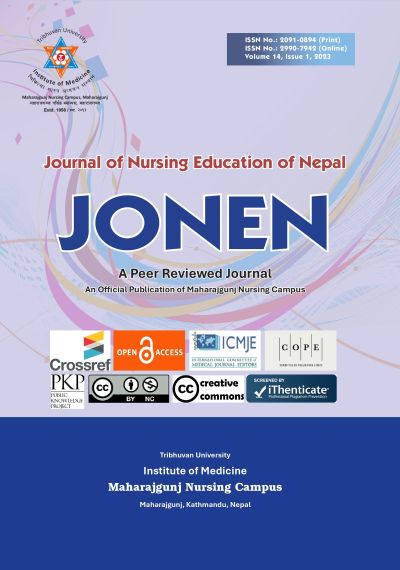Perceived Stress and Coping Strategies among Pregnant Women at a Tertiary Hospital, Bharatpur
Keywords:
Coping Strategies, Perceived stress, Pregnancy, WomenAbstract
Introduction: Pregnancy is a transitional phase of women’s life in which pregnant women experiences physiological, psychological and social changes causing varying forms and levels of stress in all trimesters and they need to adopt different coping strategies for managing the stress for better pregnancy outcome. Thus, this study assessed the perceived stress and coping strategies among pregnant women in their third trimester.
Methods: A cross-sectional research design was adopted. A total 345 pregnant women in their third trimester were included by using purposive sampling technique. Data was collected during August 7th 2022 to September 22nd 2022 at Bhartpur hospital. Pre-tested tool was used to collect the data for assessing perceived stress and Brief-COPE scale was used to measure coping strategies. Data was analyzed using descriptive statistics and inferential statistics specifically Chi square test and Fisher’s exact test was used to find out the association between level of stress and selected variables. Further, spearman’s rank correlation coefficient was used to find out the relationship between level of stress and coping strategies.
Results: One fifth (19.7%) of the respondents had high level of perceived stress during third trimester of pregnancy. Presence of perceived stress was highest on childbirth process dimension with median percentage (32.0%) followed by followed by stress of newborn baby’s health status and care with median percent ( 25%) and Stress about postpartum health conditions and support ( 20%). Majority (65%) of the respondents had used emotional focused coping strategies for dealing with stress followed by problem focused coping strategies with median percent (62.5 %.
The level of perceived stress of respondents was significantly associated with respondent’s spouse educational status (p=.007) and gestational age (p=.024). Perceived stress and coping strategies had weak positive correlation (r =.111).
Conclusion: One fifth of the pregnant women had high level of perceived stress. Level of perceived stress is highest in the childbirth process dimension and care of new born. Perceived stress is significantly associated with educational status of spouse. Regarding coping strategies, emotional focused coping strategies were more likely to be used for dealing with stress. There is weak positive relationship between perceived stress and coping strategies.
Downloads
Downloads
Published
How to Cite
Issue
Section
License
Copyright (c) 2023 Journal of Nursing Education of Nepal

This work is licensed under a Creative Commons Attribution-NonCommercial 4.0 International License.
This license enables reusers to distribute, remix, adapt, and build upon the material in any medium or format for noncommercial purposes only, and only so long as attribution is given to the creator.




